Local Offer
The local authority is required to publish its Local Offer detailing the provision and services available in the local area for special education needs and disability (SEND), and additional education needs (AEN) children and their families. As All Saints Nursery is accessing public funding, we have a duty to co-operate with the local authority by contributing to the provision available and developing the range of services.
Q & A
1. How do we identify children with additional needs or SEND?
You, as the parent, are the expert for your child, and you may be aware of some difficulties that your child may be experiencing or have some concerns surrounding their development. Possibly, your child’s health visitor, nurse or paediatrician has raised concerns with you also. We work collaboratively with you, your child and the other professionals involved to get the best outcome and support for your child.
Children are assigned a key person when they start at nursery who will monitor the child closely through; spending time with them, assessment, observation and completing any relevant paperwork. We will also look at their well-being and involvement, schemas (repeated patterns of play) and characteristics of effective learning.
We run an open door policy, which means parents can drop in at any time to come and view the nursery or speak to a member of staff about your concerns.
A few weeks after attending Nursery we are required to complete a ‘Two Year Progress Check’. This is based on the three prime areas of development; Personal, Social and Emotional, Communication and Language and Physical Development. We will also complete a Milestones Assessment Toolkit (MAT) which monitors their development levels. If there are any concerns surrounding these areas of development, the key person will talk to the SENCo (Special Educational Needs Coordinator) and with you to discuss the next steps; which might be to involve an outside agency such as a Speech and Language Therapist. We aim to identify any additional support needed at the earliest opportunity so the child is able to reach their full potential.
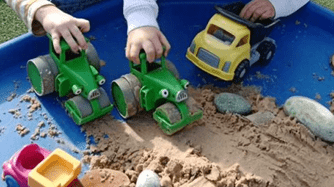
2. How will I be informed /consulted about the ways in which my child is being supported?
The SENCo or any staff member will always be willing and able to listen and speak to you about any concerns you have regarding your child. Our Nursery holds an open door policy and parents are able to come and speak to a member of staff whenever they need to. We have a cabin in the garden which we use for meetings which require privacy.
When SEN support is needed and parents have been informed, the child will be placed on the SEN register, and a targeted or personalised plan (when outside agencies are involved) will be put in place. The key person will complete this with the SENCo and input from the parents; as well as considering the views of the child. The plans will look at: what the child enjoys, what they find difficult, how the key person/parents can help, SMART (Small, Measurable, Achievable, Realistic, Time frame) targets and how the child learns best. These are reviewed every 6-8 weeks with the SENCo in a meeting with the parents and key person., and a new plan will be written and put in place.
Our online Tapestry learning Journals also allows parents to access observations, reports, as well as have a two way conversation with their child’s key person and the management team.

3. How will the setting adapt the EYFS framework for my child’s needs?
The setting should adapt to meet the needs of the child not the child adapting to meet the requirements of the setting.
At All Saints Nursery we strive to plan from the children’s interests and follow them if they change. Each member of staff knows all the children, especially their own key children. They can adapt the learning environment to suit different needs so they can explore and experience in a way they prefer and works best for them. We can also offer extra support through their targeted and personalised plans, and 1:1 support if needed. We can also have resources they enjoy readily available for them to choose and explore themselves. Staff strive to allow children to be as independent as possible and make the environment accessible for all. The key person should work hard at differentiating the activity for how individual children learn, for example if they are visual, auditory or physical learners.
All Saints follows the Statutory Framework (2021) for practitioners who work with children birth five years. This ensures that whatever the age and stage of the child and their development, they will be fully included so they can strive to reach their full potential. The framework outlines 7 features of effective practice; 1) the best for every child 2) high quality care 3) Curriculum 4) Pedagogy-helping children to learn 5) Assessment- checking what they have learnt 6) Self regulation and executive function 7) Partnership with parents.
The SENCo within the nursery has less key children, and designated times where they can work with small groups or individual children on different aspects of their development.
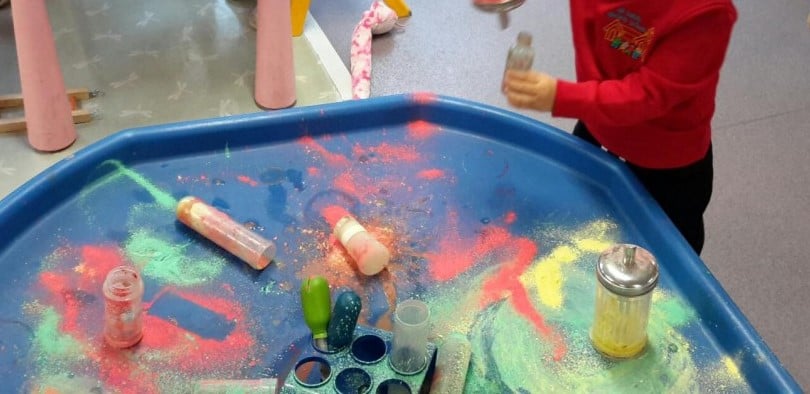
4. What teaching strategies does the setting use for children with additional needs or learning difficulties?
All staff have got a high level of training and are constantly learning and updating their knowledge, the SENCo oversees the implementation of support and will identify if any future specific training is needed.
The staff within the setting use the Characteristics of Effective Learning throughout their work, especially while planning the learning environment, and we always strive to have exciting, new activities which have many sensory factors to keep them involved and learning. Characteristics of Effective Learning: Playing and Exploring, Active learning, Creating and thinking critically.
We use Visual timetables, timers and Now and Next Boards to help children understand routines within the Nursery, Social Stories are especially useful if we are going out on a trip. This provides a simple story and photographs of exactly where we are going written in a way that the child responds to. We all do Makaton signing with all children; a quiet area where children can have some time away from the rest of the nursery, calm down or do a quiet activity on their own. We also have small group time and 1:1 times with a familiar adult working on aspects of development.
The SENCo will liaise and work with outside agencies, such as; Speech and Language therapists, Health visitors, Paediatrician, SENIF Practitioners, Portage workers and Early Help Home Visitor to make sure we are following the therapists recommendations as best we can.
Strategies previously used:
-SMART targets
-Portage checklist and targets
-Bereavement training and support
-TEACCH (teaching, expanding, appreciating, collaborating, cooperating, holistic)
-Small group time focusing on different areas
-Makaton
-Intensive Interactions
-VERVE pathway
-Visual supports
-Sensory circuits
-Sensory toys and activities
-SALT training and targets
-PECS
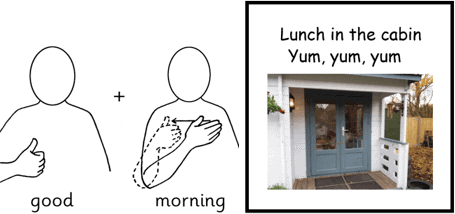
5. What additional support does the setting provide for children with additional needs or SEND?
Claire is the SENCo and her role is to be an advocate for all children with additional needs and coordinate and support your child may need during their time in the setting. Claire has a degree in Early Years Education and Care and has worked with children since 2011 and held the position of SENCo since 2018
Our main objective is to get it right for all the individual children within our setting and to provide a safe, nurturing, happy environment where children grow in confidence, independence and ability. Within the Nursery we aim to provide appropriate support for every individual child’s needs, for example if 1:1 support is needed, we will provide an extra adult to either provide this or for them to cover the key person so they can be 1:1 support.
If appropriate the key person may join you for therapy sessions so they can learn the skills needed and input them back into the setting. We can also provide relevant training and parenting groups in local childrens centres for you to attend, as well as other organisations for children and families.
As an Early Years provision we are able to access different types of funding for different types of support. This will be funding such as Early Years Pupil Premium (EYPP), Disability Access Funding (DAF, Special Educational Needs Inclusion Funding (SENIF) and access to Specialist Teaching Service.
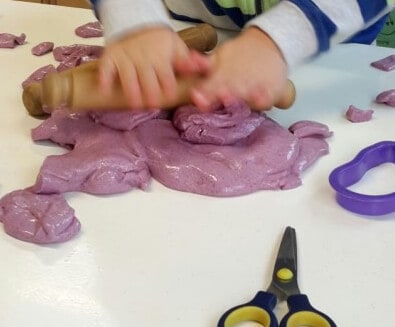
6. How will the setting monitor my child’s progress and how I will be involved in this?
We use Online Tapestry Learning Journals which have observations (photos and videos) uploaded to, for parents to see by their key person which reflect your child's progress. The key person will also track your child's progress and will share and discuss this with you at regular meetings. Parents are also able to upload observations which creates a lovely two way conversation and staff can see any special things the children have been doing outside of nursery.
The manager and SENCo have a monitoring role for all the children within the nursery and will use a tracker to monitor every childs progress.
For those children that have Targeted Plans and Personalised Plans, parents will be involved in the writing and reviewing in meetings with their childs key person and the SENCo every 6-8 weeks.

7. How do you ensure children with additional needs or SEND can be included in the same activities as other children, including trips?
We aim to include all children in the same activity and to be a fully inclusive setting and strive to make necessary and reasonable adjustments for all children. Every child is an individual and should be treated as such. To achieve this the activity plan is differentiated for each child. For example: for a group singing activity, some children may join in for all of it, some may only join in certain actions and others may need 1:1 support during this time.
We aim to provide extra adult support whenever the child needs it; whether that is constantly or just at transitions and group times. When we introduce a new activity that may cause difficulty for a child we will do this slowly and at the individual childs pace. For example; with sporty tots, we would first take them with a familiar adult to watch, then if they are ready they can join in with a supporting adult, and finally when they feel confident enough they can join in independently.
We aim to make all our trips inclusive to all children. We prepare them by discussing it at group time, using Social Stories with pictures detailing exactly where we are going and what we will be doing. We will also aim to have extra support for the child with a familiar adult. The staff member/s in charge of the outing will complete a risk assessment for the area but also for the child themselves and how we can make it more inclusive and accessible for them.
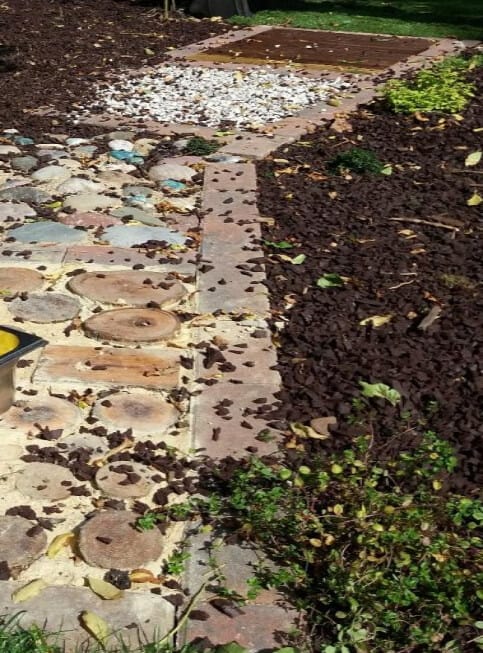
8. How accessible is the building for children with mobility difficulties/wheelchair users?
Our nursery is all on one level, including all entrances and exits, the doors can be opened wide enough for a wheelchair. We also have a wheelchair accessible toilet. Our garden has a small drop from the AstroTurf to bark chip, and there is a small step into the cabin in the garden. For wheelchair users we can provide accessibility ramps for both. For children who may have mobility difficulties the ramps can also be used or adult support will be provided.
We have a large onsite carpark and we are opposite a bus stop.
Depending on the childs needs we will strive to make all activities, resources and furniture accessible for them no matter what the need.

9. How will you support my child’s transition to a new setting or school?
Our transitions to schools start early when they first receive their offers in term 5. The new teachers, key person and SENCo will have meetings with the parents to discuss the best strategies for the children on how to support them.
We try to do as many school visits as possible, parents take them, and we take them without parents for a morning so they are as familiar with it as possible. We also provide school based activities during the last term, Such as; school dinners week, a school based role play with uniform from the local schools, books for the schools containing pictures of their new teachers, the playground, their classroom and the school hall.
All childrens schools will receive a document called ‘All About Me’ which is a one page profile including their likes/dislikes, how they learn best, what they need support in, schemas and characteristics of effective learning, their well being and involvement and any medical or SEN needs. The MAT assessment is also included on the back of this for schools to see where the child is developmentally.
If a child has SEN needs the SENCo will create a more in depth ‘Communication passport’ which high lights needs, professional involvement, how I communicate best, how best to communicate with me, how you can help me, what I am working on and any other necessary information. The SENCo will also attend a SEN transition meeting with all the schools in the district and with parental permission share any information they feel necessary to the child and their transition to school. The SENCo may also organise more meetings with the new school, parents and the nursery.
*Please see our Transitions Policy
10. How does the setting assess the overall effectiveness of its SEND provision and how can parents/carers take part in this evaluation?
The SENCo will attend regular SEN Forum meetings to update her knowledge and meet the local SEN team. We will also take part in Local Inclusion Forum Team (LIFT) meetings with a group of experts to raise concerns and find the best way forward for the child.
We will also regularly review with the parent the Best Practice Guidance Audit Tool for each child on the SEN register to ensure we are following the best practice for each child. Parents will also take part in reviewing the Special Educational Needs Inclusion Fund (SENIF) regularly to ensure we are using it appropriately and the best way for the child. Parents will also be offered regular meetings with the SENCo and key person to evaluate their SEN provision and any concerns they may have.
We also send out an annual SEN questionnaire to parents to evaluate our SEN provision.

11. Who should I contact if I am considering registering for a place at the setting?
To register for a place, please contact the office on 01227 282628, our admission team is always pleased to provide the information you need.
Please also come in and visit us as this is the best way to get a feel of the setting and meet the team here! Our manager will show you around the setting and answer any further questions you may have.
You also can email us: admin@allsaintsnurserywhitstable.co.uk

12. What arrangements does the setting have for feedback from parents/carers, including compliments and complaints?
The staff are always available to listen and discuss anything you would wish to talk to us about or if you would prefer a member of the management team is always on hand.
Questionnaires are sent to parents regularly for suggestions and feedback.
A complaint box is located by the office door to receive any complaint from parents /carers. There is a detailed complaint policy on the web-site.
Additional Information
Allergies
We have recently been asked a lot about allergies and intolerances and how we deal with those within the nursery. Our Nursery holds a No nut or egg Policy. We do not allow any nut or egg products within the setting as many children can have allergies against those. Upon registering with the Nursery you will be asked on the forms if your child has any health concerns and we will create a care plan with you regarding those needs.
We offer dairy free butter for all the children and on request can provide dairy-free milk/cheese or vegan alternatives.
If we do any cooking within the setting we take all allergies and intolerances into consideration and will make adjustments for those children.
Thank you for taking the time to read our Local Offer and we look forward to hearing from you soon. If you have any other queries or questions please do not hesitate to get in contact with us.